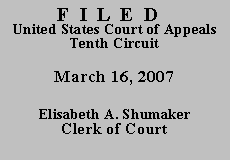

| UNITED STATES OF AMERICA,
Plaintiff-Appellee, v. DARRELL TRIPLETT, Defendant-Appellant. |
|
At the sentencing hearing on June 21, 2004, the district court found that defendant's offense and relevant conduct amounted to 397.78 kilograms of cocaine, that he possessed a firearm in connection with the offense, that he was a manager or supervisor of five or more participants, and that he had obstructed justice by committing perjury at his trial, which had ended in his guilty plea. Based on these findings, the court determined that defendant's adjusted offense level was 43 and his criminal history level was II. Under the sentencing guidelines, this produced a sentence of life on each count. Accordingly, the district court sentenced defendant to concurrent life sentences.
Defendant filed a notice of appeal challenging his sentences on June 29, 2004, which was docketed as appeal No. 04-3237. The United States, in turn, filed a motion to enforce the waiver of appeal rights contained in the plea agreement. While that appeal was pending the Supreme Court issued its decision in United States v. Booker, 543 U.S. 220 (2005), which significantly altered the sentencing landscape. In light of the Booker decision, the United States reconsidered its position on defendant's appeal. It filed a motion confessing that the district court had committed both constitutional and non-constitutional Booker error in sentencing defendant, that the errors were plain, that they affected substantial rights, and that they ought to be noticed. Therefore, the government withdrew its motion to enforce the appeal waiver and asked that the case be remanded for resentencing. This court granted the motion and remanded the case to the district court with instructions to vacate the sentence previously imposed and resentence defendant in accordance with Booker.
The district court resentenced defendant on May 30, 2006. At the resentencing hearing, the court determined that while the guidelines advised a life sentence on each count, the court was not going to impose a life sentence. Instead, taking into account the other sentencing factors contained in 18 U.S.C. § 3553, the court determined that a more reasonable sentence on each count was thirty years. Thus, the court imposed concurrent thirty-year sentences.
Defendant again filed a timely appeal of his sentence. His counsel filed a brief pursuant to Anders v. California, 386 U.S. 738 (1967), concluding there were no non-frivolous arguments for appeal, but advancing two arguments his client would have him make. Counsel then moved to withdraw. Defendant was given an opportunity to file a pro se response to his counsel's Anders brief, which he did. Rather than file a merits brief, the United States moved to enforce the waiver of appeal rights contained in the plea agreement pursuant to United States v. Hahn, 359 F.3d 1315 (10th Cir. 2004) (en banc) (per curiam).
Defense counsel has responded to the government's motion stating that it is appellant's position that the court did not determine the appropriate guidelines range and thus did not impose a sentence within the appropriate guidelines range, so this court should consider the merits of his appeal rather than deem it waived under the plea agreement. Defendant also was given an opportunity to respond to the government's motion, which he did. In his pro se response, he argues that the government forfeited its right to enforce the appeal waiver when it filed its motion in appeal No. 04-3237 confessing error, withdrawing its motion to enforce the appeal waiver, and seeking a remand. He also argues that the government's confession of plain error in the earlier appeal demonstrates that the plea agreement itself was not sound and should not be enforced. Finally, he argues that once this court remanded the case for resentencing it somehow vitiated the plea agreement and the waiver of appeal rights contained in that agreement.
Under Hahn, we consider "(1) whether the disputed appeal falls within the scope of the waiver of appellate rights; (2) whether the defendant knowingly and voluntarily waived his appellate rights; and (3) whether enforcing the waiver would result in a miscarriage of justice." 359 F.3d at 1325. The miscarriage-of-justice prong requires the defendant to show (a) his sentence relied on an impermissible factor such as race; (b) ineffective assistance of counsel in connection with the negotiation of the appeal waiver rendered the waiver invalid; (c) his sentence exceeded the statutory maximum; or (d) his appeal waiver is otherwise unlawful. Id. at 1327. The government's motion addresses these considerations, explaining why none of them undermines defendant's appeal waiver.
We have carefully reviewed the plea agreement, the transcripts of the plea hearing and the resentencing hearing, counsel's Anders brief, defendant's pro se brief, and the materials filed by the parties in connection with the current motion to enforce the plea agreement. "Under Hahn, we conclude that defendant has waived his right to appeal and his contrary arguments are without merit."
Accordingly, we GRANT the government's Motion for Enforcement of Plea Agreement and DISMISS the appeal. Defense counsel's motion to withdraw is GRANTED. Defendant's Response and Objection to "Former" Counsel's Response to Appellee's Motion for Enforcement of Plea Agreement and Motion to Dismiss Counsel is DENIED as moot. The mandate shall issue forthwith.
ENTERED FOR THE COURT
PER CURIAM
*. This panel has determined unanimously that oral argument would not materially assist the determination of this appeal. See Fed. R. App. P. 34(a)(2); 10th Cir. R. 34.1(G). The case is therefore ordered submitted without oral argument. This order and judgment is not binding precedent, except under the doctrines of law of the case, res judicata, and collateral estoppel. It may be cited, however, for its persuasive value consistent with Fed. R. App. P. 32.1 and 10th Cir. R. 32.1.